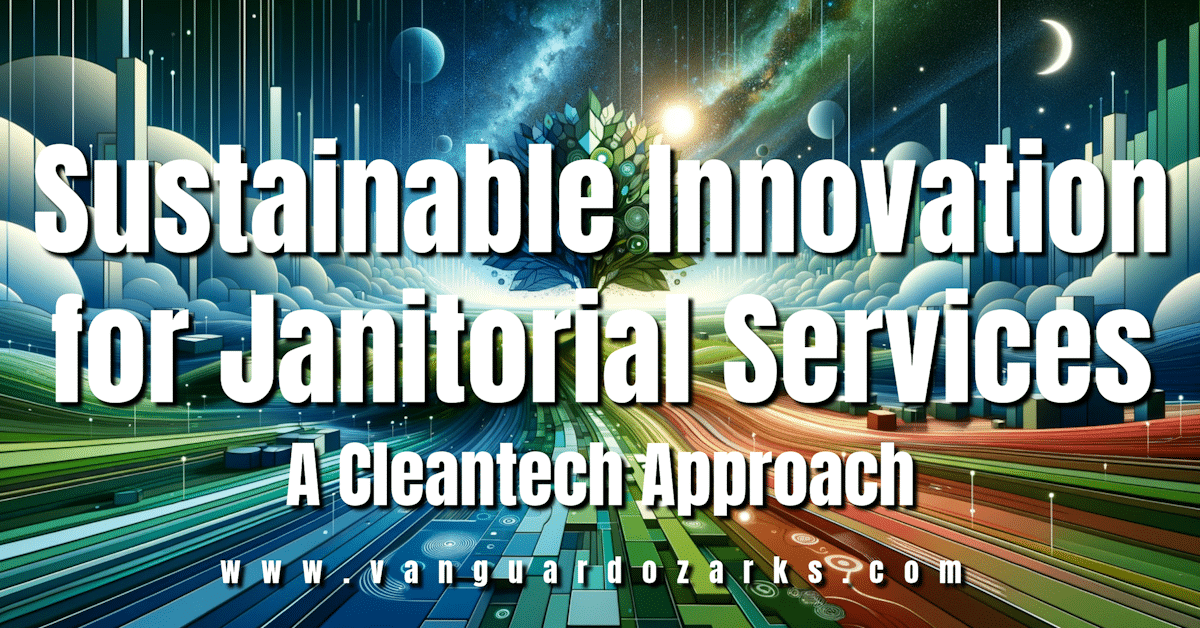Discover how embracing sustainability and dynamic capabilities revolutionizes janitorial services, transforming routine cleaning into a powerful engine for environmental innovation and operational excellence.

Laying the Foundation: Sustainability and Dynamic Capabilities in Janitorial Services
Sustainability is not just a buzzword but a critical imperative across industries, including the often-overlooked janitorial services sector.
This sector plays a pivotal role in maintaining health, hygiene, and the overall well-being of our communal environments, from office buildings to schools and hospitals.
However, the environmental impact of traditional janitorial practices—characterized by significant water consumption, use of harsh chemicals, and reliance on non-renewable resources—has prompted a reevaluation of how cleaning services operate.
The imperative for sustainability in janitorial services transcends the mere adoption of green products; it involves a comprehensive transformation towards eco-friendly, efficient, and socially responsible business practices.
The concept of dynamic capabilities emerges as a cornerstone in driving this transformation.
Initially coined in the context of strategic management, dynamic capabilities refer to a business's ability to integrate, build, and reconfigure internal and external competencies to address rapidly changing environments.
In janitorial services, this translates to the ability to innovate sustainably—adapting processes, technologies, and business models to mitigate adverse environmental impacts and leverage sustainability as a source of competitive advantage.
This approach recognizes customers' evolving expectations, regulatory landscapes, and the global challenge of environmental sustainability.
It involves adopting existing green technologies and practices and continuously innovating and developing new solutions to achieve more sustainable outcomes.
Fostering sustainable innovation within the janitorial industry requires a shift in mindset and operations.
It demands a commitment to continuous learning, process improvement, and the strategic incorporation of technological advancements to reduce environmental footprints while enhancing service efficiency and effectiveness.
By adopting dynamic capabilities, janitorial service providers can navigate the complexities of sustainability, transforming challenges into opportunities for innovation, growth, and leadership in environmental stewardship.
Sustainable Innovation in Cleantechs: Key Takeaways
- The Essence of Cleantechs: At the core, cleantechs integrate a high-tech focus on renewable resources, prioritizing environmental sustainability in product and service innovation. This approach reduces ecological footprints and sets a new sector benchmark for efficiency and quality.
- Driving Forces of Sustainable Innovation: The strategic decision-making process is a pivotal element influencing the successful adoption of dynamic capabilities. These decisions, centered around sustainability, empower organizations to seamlessly incorporate green technologies and practices, fostering a culture of innovation and environmental responsibility.
- Technological Sustainability and Spillover Effects: The advancement of digital technologies plays a crucial role in improving the efficiency and scalability of clean technologies. This digital shift leads to spillover effects beyond the confines of individual organizations, promoting the adoption of sustainable practices across industries and society and contributing to a more environmentally conscious global community.
- The Model of Innovation: The proposed model for sustainable innovation emphasizes a structured and iterative approach to integrating sustainability into the corporate strategy. It advocates for continuous adaptation to technological and environmental changes, ensuring businesses remain competitive while committing to sustainable development. By following this model, companies can navigate the complexities of modern markets, benefiting both the environment and their operational success.
FAQ Section
What are Cleantechs?
Cleantech companies specialize in products and services designed with a keen focus on sustainability and environmental preservation.
They leverage advanced technologies to harness renewable resources, reduce pollution, and improve energy efficiency.
The importance of cleantechs lies in their ability to offer innovative solutions that tackle environmental challenges while supporting economic growth, making them pivotal in the transition towards a more sustainable global economy.
How Do Decision-Making Processes Affect Innovation?
The study underscores the significant impact of decision-making processes on fostering organizational innovation capabilities.
Strategic decisions prioritizing sustainability and adaptability can empower companies to develop and refine their dynamic capabilities, enhancing innovation in products, services, and operational practices.
This approach allows businesses to remain competitive in a rapidly evolving market, ensuring they can respond effectively to new environmental regulations, consumer demands, and technological advancements.
Why Is Technological Sustainability Important?
Focusing on technological sustainability is crucial because it ensures that adopting and developing new technologies contribute positively to the environment.
By prioritizing renewable resources and sustainability, companies can minimize their ecological footprint, reduce waste, and promote energy efficiency.
This benefits the planet and offers economic advantages, such as cost savings, improved brand reputation, and compliance with environmental regulations, thereby supporting long-term business viability.
What Are the Implications for Businesses?
Leveraging the model of sustainable innovation through dynamic capabilities presents significant implications for businesses aiming for sustainable growth and innovation.
By integrating sustainability into their core strategy and operations, companies can unlock new opportunities for efficiency, differentiation, and market leadership.
This approach encourages a culture of continuous improvement and adaptability, enabling businesses to thrive amidst environmental and technological changes.
Additionally, embracing sustainability can enhance a company's reputation, attract environmentally conscious consumers, and meet increasing regulatory requirements, which is essential for sustained business success in today's eco-conscious market.
References
- Noronha, M. E. S. de ., Ferraro, D. M. J., & Silva, R. de S. V.. (2023). The Decision-Making Process for Developing Sustainable Innovation via Dynamic Capabilities in Cleantechs. Organizações & Sociedade, 30(105), 203–240. https://doi.org/10.1590/1984-92302023v30n0007EN
Takeaway
The journey through the landscape of sustainable innovation in cleantechs underscores a pivotal transformation within the global market.
This exploration has illuminated the essence of cleantech companies, whose innovative products and services, grounded in environmental stewardship and efficiency, pave the way for a greener future.
The critical role of strategic decision-making processes in fostering dynamic capabilities for innovation has been highlighted, emphasizing the need for a forward-thinking approach that prioritizes adaptability and sustainability.
Moreover, the discussion on technological sustainability and its indispensable benefits reveals the profound impact of focusing on renewable resources and sustainable practices for environmental health and economic and operational efficiency.
Reflecting on the insights and findings, the importance of integrating sustainable innovation into business operations cannot be overstated.
It represents a confluence of ethical responsibility and strategic advantage, offering a blueprint for companies to navigate the challenges and opportunities of the 21st century.
The imperative for businesses to adopt these strategies and models for sustainable growth is evident.
Doing so is not merely an act of environmental conservation; it is a strategic move towards ensuring resilience, competitiveness, and long-term success in an increasingly eco-conscious global market.
Businesses are encouraged to embark on this transformative journey with earnestness and commitment.
Adopting the discussed strategies involves:
- Reevaluating current practices,
- Embracing technological advancements with sustainability in mind and;
- Fostering a culture of innovation that prioritizes the planet's health alongside business growth.
It means investing in renewable resources, reducing waste, and continuously seeking ways to improve operational efficiency and environmental impact.
The path to a sustainable future is paved with challenges and immense opportunities.
By championing sustainable innovation, businesses can lead by example and contribute to a healthier planet and a more sustainable economy.
The call to action is clear: It is time for businesses to align their strategies with sustainability principles and dynamic innovation.
In doing so, they ensure their own prosperity and contribute to the planet's well-being and future generations.
Adopting these practices is not just a step toward sustainability but a leap toward a brighter, cleaner, and more innovative future.
Vanguard Cleaning Systems® of the Ozarks' franchise-owned custodial service provider business cleans more than 8M sq. ft. weekly, maintaining an industry topping 95+% of its customer base, year-over-year, and boasting more than 60 5-star Google reviews.
Need more capability from your vendor partners? --Let's talk.
In Oklahoma, dial 918-960-4450
In Arkansas, dial 479-717-2410
In Missouri, dial 417-812-9777

